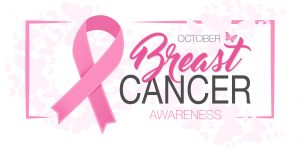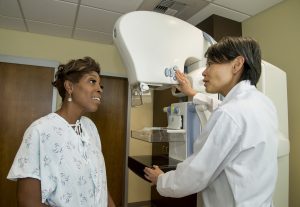2019 Breast Cancer Awareness Month
Breast Cancer Awareness Month

Photo Credit: Shutterstock ID 724735630
October is Breast Cancer Awareness Month, an annual observance to increase awareness of the disease. Other than skin cancer, breast cancer is the most common cancer among women who reside in the United States. According to the Centers for Disease Control and Prevention, symptoms of breast cancer vary. They may include:
- Any change in the size or shape of the breast
- Pain in any area of the breast
- Nipple discharge other than breast milk – including blood
- A new lump in the breast or underarm
Some of the main factors influencing one’s risk of developing breast cancer include:
- Being a woman
- Being older – most breast cancers are found in women 50 years old or older
- Having changes in you BRCA1 or BRCA2 genes.
Regarding breast cancer, consider this…
- Annually in the United States, over 245,000 women will get breast cancer and 40,000 women will die from the disease
- Men also get breast cancer – though it is not very common. Less than 1% of breast cancers occur in men.
- Most breast cancers are found in women 50 years of age and older
- Younger women can develop breast cancer as well – 10% of all new cases of breast cancer in the United States occur in women younger than 45 years old.
What can be done to reduce the risk of developing breast cancer?
Several factors across one’s lifespan can influence the risk of developing breast cancer. Some of which cannot be altered – such as getting older or having a family history of the disease. However, the CDC offers are some measures we can take in lowering our risk:
- Maintain a healthy weight
- Regularly exercise
- Avoid alcohol consumption or limit alcoholic drinks to one a day
- With your doctor’s guidance find the right hormone replacement therapy or oral contraceptives (if either are taken or you are instructed to take)
- If possible, breastfeed your children
- Consult your doctor for guidance around how best to lower your risk – especially if you have a family history of breast cancer or inherited changes in your BRCA1 and BRCA2 genes.
In which ways can UW Medicine support patients wanting to learn more about their risk for developing breast cancer?

Photo Credit: UW Medicine Photo Library
UW Medicine’s Center for Women and Children offers specialized screening, treatments and services for every woman and child. Regarding breast care, UW Medicine provide common services to help patients to achieve the most optimal healthcare outcomes.
- Breast health and screening
- Identifying risk factors
- Identifying warning signs
- Medical treatment options for breast cancer
- Notification of breast density
- Patient education
- Patient support and resources
- Surgical treatment options for breast cancer
There are three locations within the UW Medicine systems that can provide patients with breast care services: Breast Clinic, Northwest; Breast Health Clinic at SCCA; and Seattle Breast Center.